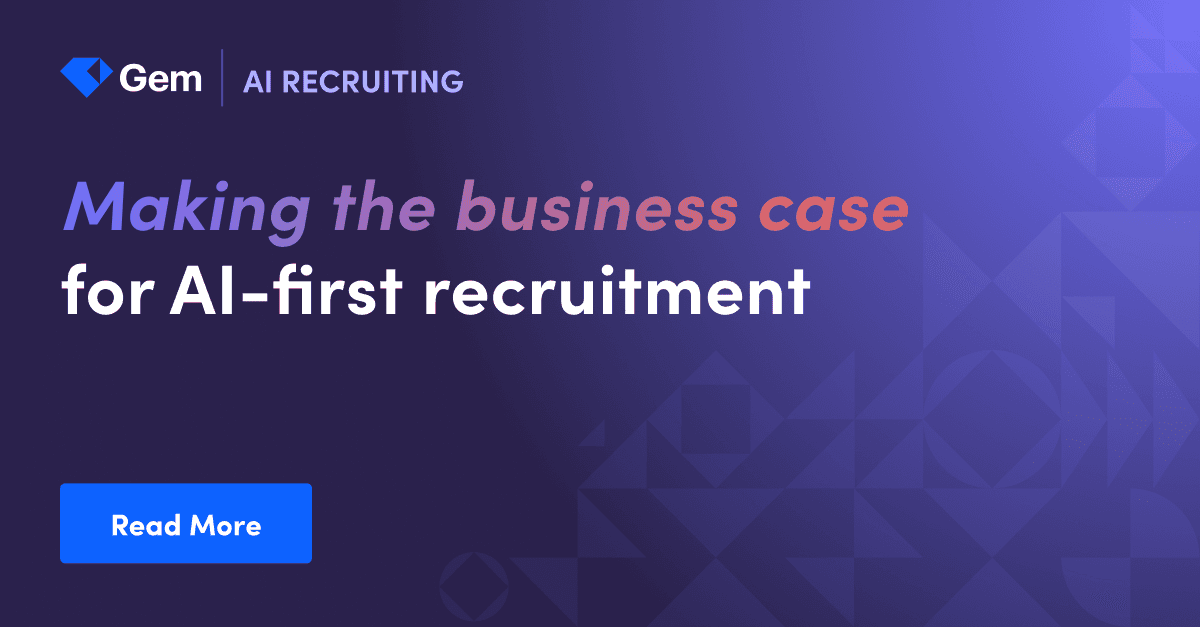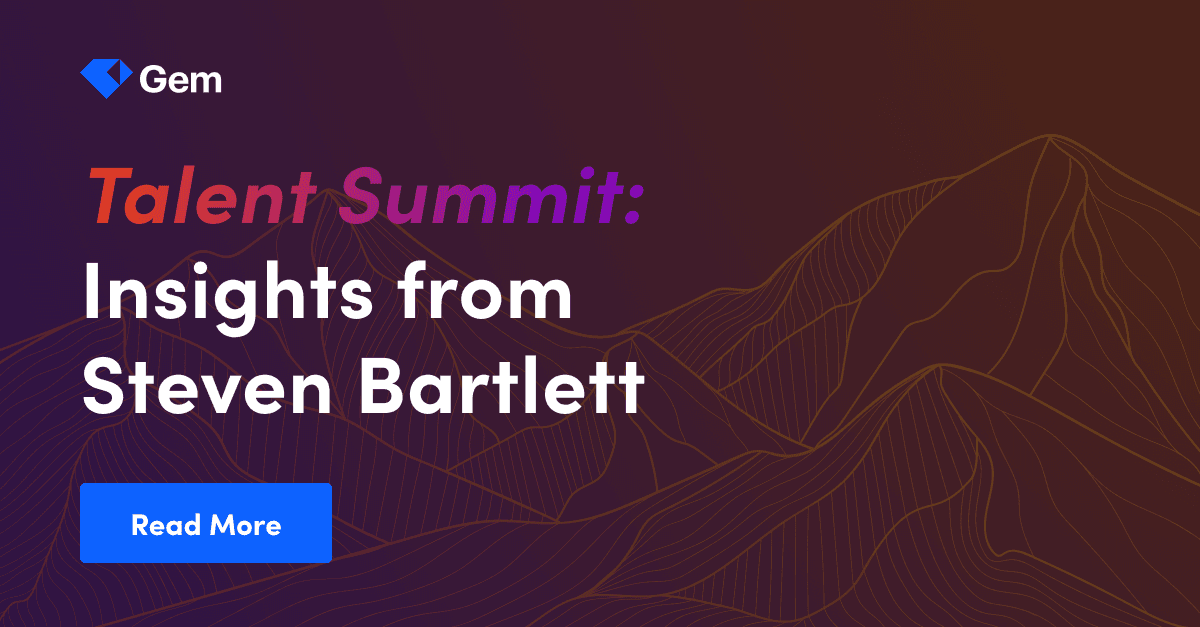At this year's Talent Summit, Steven Bartlett, entrepreneur and founder of FlightStory, Thirdweb, and “The Diary Of A CEO” podcast, shared why he dedicates 20-30 hours per week to recruiting, and why every CEO should consider themselves head of recruitment. His fireside chat with Hung Lee, editor at Recruiting Brainfood, revealed the cultural frameworks and hiring philosophies that have powered his companies' growth, and the insights are transformative.
Why every CEO should be the Head of Recruitment
"I consider myself to be the head of recruitment. This isn't just executive rhetoric. It's a fundamental business philosophy rooted in a simple truth: the furthest upstream thing in business is the group of people you assemble.” - Steven Barlett, Founder of FlightStory, Thirdweb, “The Diary Of A CEO” podcast
Steven's approach is built on three foundational principles:
Finding the world's best people to fulfill the mission
Binding them with a culture that makes them do the best work of their lives
Setting them a vision and mission that is worthwhile and valuable
This framework emerged from a revealing analysis with his brother Jason, who discovered that Steven's net worth could be traced back to approximately 10 exceptional hiring decisions a decade ago. Those 10 people didn't just perform well; they hired other great people, creating a compound effect that propagated throughout the organization.
Culture isn't what you say. It's how you behave.
One of Steven's most powerful insights challenges how most organizations think about culture.
"Culture isn't the values and the fluffy words that you come up with when you do your off-site with your team. Culture is how you behave." - Steven Barlett, Founder of FlightStory, Thirdweb, “The Diary Of A CEO” podcast
To implement this understanding, Steven developed the "Culture Test,” a scenario-based screening tool that reveals how candidates behave in specific situations. Instead of asking generic questions about values, the test presents real scenarios:
A client texts on Saturday night, needing login details while you're at dinner with your spouse
Your company gets hacked at 4 AM, sending abusive messages to all clients from your email.
You've worked on a project for six months, and two days before the deadline, your boss scraps it based on new data.
The responses reveal critical cultural attributes like urgency, kindness, work ethic, and adaptability to change. When tested across their organization, Steven found that all high-performing employees scored above 50 out of 100, while every person who had been let go scored negative numbers.
The Manchester United lesson
Steven's analysis of Manchester United's legendary manager, Sir Alex Ferguson, provides a masterclass in cultural leadership. Through interviews with seven former United players, Bartlett discovered that Ferguson's obsession wasn't strategy or tactics but culture.
The revelation came through Gary Neville's story about charity footballs. When players walked past a staff member collecting signed balls for charity without stopping to sign them, Ferguson "absolutely exploded" at the team. Why? Because failing to sign those balls revealed a lack of humility, which was essential for the behaviors needed to win championships.
Ferguson understood that mission success requires specific behaviors, values, people, and processes. In Manchester United's case:
Mission: Win the Premier League/Champions League
Required behavior: Fighting back in the final minutes when trailing
Required value: Humility (willingness to sprint 200 meters in the rain when you're a millionaire with a Ferrari)
Cultural signal: Signing charity balls for the local community
This framework — mission → behaviors → values → people/processes — applies directly to business hiring and culture building.
Experimentation as a competitive advantage
When asked about his podcast's rapid rise from zero to global top 10, Steven emphasized that his team's competitive edge wasn't intelligence or expertise. It was experimentation.
This approach is particularly relevant for TA professionals who struggle with content creation and employer branding. Steven's advice is direct: focus on speed of feedback loops, not perfection.
His recommendation for overcoming content paralysis:
Set a goal of reaching 100 posts, not creating perfect content
Remove performance anxiety by ignoring metrics initially
Create accountability through public commitments or partnerships
Focus on activity (posting consistently) rather than outcomes (engagement rates)
"You don't need to be smart to do something great. You have to have a system of getting to better knowledge than your competitors." - Steven Barlett, Founder of FlightStory, Thirdweb, The Diary Of A CEO
Preparing for the AI transformation
Speaking fresh from an interview with AI godfather Geoffrey Hinton, Steven offered realities and optimistic opportunities about AI's impact on recruitment and hiring.
Professionals' fundamental choice is whether to perceive AI as a threat (and respond with avoidance) or as an opportunity (and react with engagement). For recruiters, this means AI handling administrative tasks while humans focus on relationship-building, cultural assessment, and strategic talent planning — the distinctly human elements that create competitive advantage.
How AI changes hiring priorities
Steven's company has launched an "AI agent competition" to identify which roles and tasks can be automated over 60 days. This isn't about replacing people wholesale. It's about understanding how roles will evolve and what human capabilities become more valuable.
Three attributes now top his hiring priorities:
Taste: In a world where AI can generate infinite content, someone still needs to choose what's good
Hard work and agency: AI tools still require human initiative and effort to be effective
Pro-change attitude: With technology evolving weekly, adaptability becomes crucial
These priorities reflect a broader shift: as AI handles routine tasks, human judgment, creativity, and relationship skills become more valuable, not less.
A message for Talent Acquisition professionals
Steven's closing message resonated with urgency and opportunity.
"We have arguably the greatest opportunities of our lifetime right in front of us with everything that's going on at the moment with technology." - Steven Barlett, Founder of FlightStory, Thirdweb, “The Diary Of A CEO” podcast
His advice for navigating this transformation:
Lean into uncertainty rather than avoiding it
Experiment rapidly to accelerate learning
Focus on AI tools and education now, before the opportunity passes
Remember that attitude determines outcomes during periods of significant transition
Steven sees this as a defining moment, during which those who embrace change will create outsized opportunities while others will be left behind.
The recruitment imperative
Throughout the conversation, one theme remained constant: in an age of rapid technological change, the thriving companies will best identify, attract, and retain the right people with the right cultural attributes. This makes recruitment not just a business function, but the business function that determines everything else.
For TA professionals, Steven's insights offer both validation and challenge. Validation that your work sits at the heart of business success. Challenge to evolve your methods, embrace new technologies, and focus on the distinctly human elements that no AI can replicate.
The companies that get this right will survive the AI transformation and define what business looks like on the other side.
Share
Related posts

July 10, 2025
Talent Summit: How top TA leaders at Zillow & Chobani pivot fast in an unpredictable market

June 16, 2025
Making the business case for AI-first recruitment

January 16, 2024
Unconscious Bias in Hiring: A Deep Dive into Top-of-the-Funnel Disparities
Your resource for all-things recruiting
Looking for the latest data, insights, and best practices? Welcome to the Gem blog. We've got you covered.

